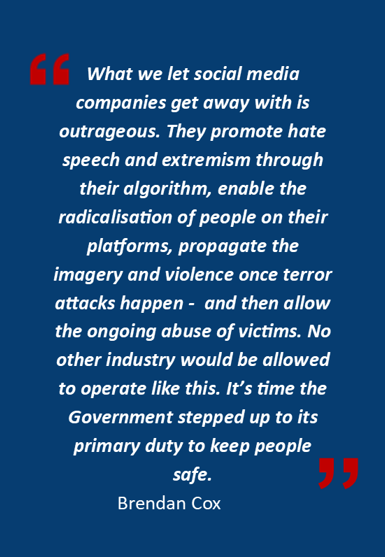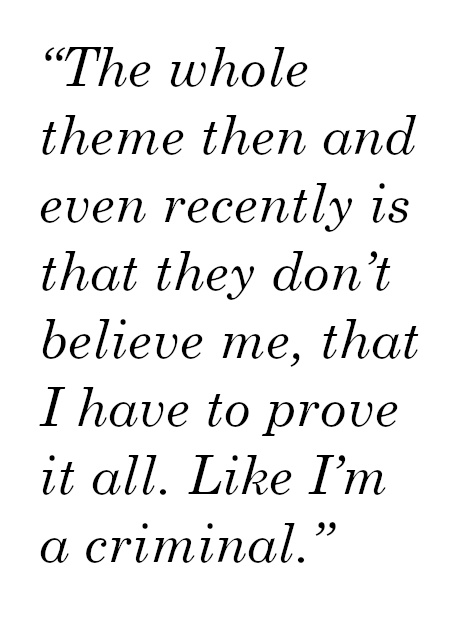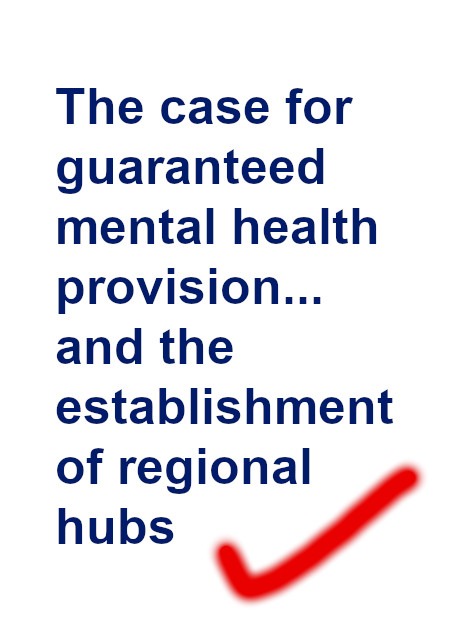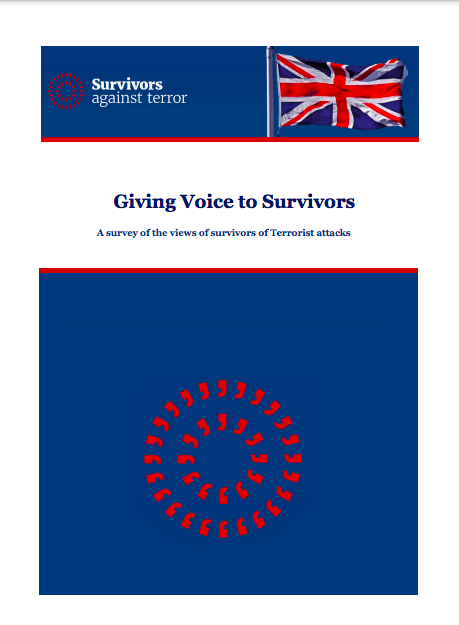Reports and Campaigns

Social Media report: November 2025
Survivors of terror attacks are facing a tsunami of trolling, harassment and malicious messages enabled by social media.
As well as the personal targeting, images of attacks – sometimes posted by attackers and their supporters – often retraumatise victims after being widely shared and reshared across various platforms. These are the findings of a major new report from Survivors Against Terror (SAT) – based on the experiences of survivors of terror.
The SAT report finds evidence that in the aftermath of terror attacks, social media presents a profound challenge for survivors – and calls on Ministers, Ofcom, the social media companies and the wider public to do more to ensure that those impacted by terror attacks are protected from the sort of abuse that in many cases already contravenes existing laws, guidelines and policies.
The report co-authors include Dr Bethan Davies and Professor Martin Innes, both from the Security, Crime and Intelligence Innovation Institute at Cardiff University, Brendan Cox (co-founder of SAT) and Claudia Vince – one of the survivors of the Fishmongers Hall attack which took place on 29 November 6 years ago this week. The survivor research was supported by Kantar.

Guidance on Media Reporting of Terror Attacks June 2025
Our research has demonstrated that while reporting on terror attacks is undoubtedly in the public interest – media intrusion into the grief and lives of the injured and bereaved is endemic – with serious impacts on victims and survivors.
We know that no journalist or editor wants to compound the impact of attacks on bereaved families or survivors and have therefore developed guidance for journalists, editors and broadcasters which will support them in reporting on terrorism while avoiding causing further harm.
The guidance largely mirrors existing Codes, but aims to draw together the provisions which are most relevant to terror attacks, and to supplement these with some additional recommendations.
We would like to see this guidance used in colleges and universities so that these principles are embedded in the training of journalists; in workplaces so that editors can ensure that best practice is observed; and by journalists when considering how best to cover the story they’re working on.
The guidance has been created in collaboration with media experts, lawyers, Counter Terror Policing, and survivors of attacks.

7/7 In Their Words - report June 2025
7/7 20 Years On – Survivors share stories and raise alarm about failures in mental health support, and the need to fix a broken system.
Jo Berry who produced this report has a few words to share
Every anniversary after a terror attack is difficult. As I reflected on the 40th anniversary of losing my dad in a terrorist attack, I found myself pondering the concept of closure. It’s a notion that suggests we can reach a point where we’re unaffected by our past, where we can return to the person we were before the tragedy. But in my experience, this isn’t the case. As the 20th anniversary of 7/7 approaches, I started wondering about the people who were affected. What did they think as the anniversary drew near? How did they feel about the approaching milestone?
This resulted in producing a report which shares the stories from the victims, survivors and bereaved of 7/7.
In this collection, survivors and loved ones describe panic attacks that lasted for years, the loneliness of being told to “get on with it,” and the silence that often followed early offers of help. They speak of the deep need to make sense of what happened, to be acknowledged, to find meaning, and to heal.
The voices in the report tell a painful but vital story. They each experienced different forms of support, gaps, and barriers. But one thread runs through every account – the lack of consistent support when people needed it most.

Recognition and Memorialisation - survey report, January 2025
Survivors call for Day of Remembrance to remember victims of terrorism. The report calls for a guarantee of recognition and memorialisation for those affected by terror attacks, as set out in the Survivors’ Charter.
In a survey for the report, 97% of British victims of terrorism stated their support for the introduction of a “National Day” in the United Kingdom, and 78% would like to see a permanent, physical or living memorial to all victims of terrorism.
In particular, Survivors Against Terror are calling for an addition to the system of Royal Honours that would recognise the sacrifice of those injured or bereaved in acts of terrorism, and the creation of a National Day of Remembrance and Tribute to Survivors of Terrorism- and that survivors be part of any decision making process.
At the 2019 General Election both major parties promised to consult on the Survivors’ Charter, nearly six years on it remains unpublished and unimplemented. now survivors are demanding action.

‘Broken’ terror compensation scheme must be replaced - survivor survey, July 2023
Survivors of terror attacks give a damning verdict on the UK’s terror compensation system in a new report by Survivors Against Terror (SAT) – leading to calls for the system to be replaced. More than 130 survivors from 11 different terror attacks responded to a SAT survey (conducted by research company Kantar) on the Government’s Criminal Injuries and Compensation Authority (CICA).
“CICA is broken. There can be no other conclusion from the data and the testimonies we have gathered. An organisation that is supposed to be helping survivors recover and rebuild is instead consistently doing them harm. If the organisation had poor processes and procedures but scored well on other areas, there would be hope for reform. There is not.” – Brendan Cox, co-author.
The report includes evidence from multiple survivors of CICA’s failure to help and compensate them and, drawing on their testimony, makes detailed recommendations for a new compensation authority supported by and overseen by the Home Office.

A Survivors' Charter - comparative research, March 2022
A comparative analysis exploring the state provided support to survivors of terrorism across eight countries and a proposal for a new UK standard. In the aftermath of the Fishmongers’ Hall attack in 2019 over 70 survivors of terrorism wrote an open letter called on the UK Government to commit to implementing a charter to guarantee the rights of survivors.
SAT have conducted research into the rights, guarantees and support available to survivors of terrorism across the world with the aim of comparing and contrasting different countries and different systems. We have incorporated the best practices from each example in order to propose a new standard for supporting those affected by terrorism, forming the “Survivors’ Charter”.

A Second Trauma - survey report, October 2021
In 2021 we conducted the largest ever survey into terrorism survivors’ experiences of, and attitudes towards, mainstream print and television media. Based on the responses we received we produced a report “A Second Trauma” (launched 2022) calling for a tightening of the Editors’ Code, for the establishment of a dedicated Hub for victims and for a voluntary agreement not to directly contact the bereaved and seriously injured in the first 48 hours following an attack.

Survivors' Mental Health Needs - survey, 2018
In 2018, SAT, in partnership with Kantar, commissioned a survey of survivors of terror attacks.
271 people responded. Whilst the support of the emergency services, paramedics and police
were rated highly, a shocking 76% rated mental health services as requiring improvement with
a significant majority rating this as highly needs improving.
In this paper we share evidence and case studies from the survey and and make specific, evidenced recommendations for improved mental health support for survivors of terror attacks as part of the national response to terrorism.
